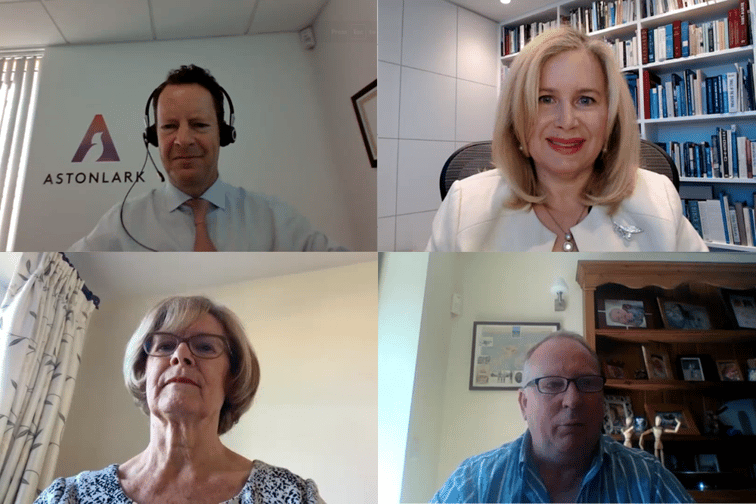

“The effects of the hard markets on the broking sector are well publicised and often discussed. However, there’s a whole generation of insurance professionals that are seeing this for the first time and it is creating a challenging business environment for many of us, as brokers, and our clients.”
Introducing the BIBA webinar on ‘Knowledge and Skills in the Hard Market’, host Kevin Hancock (pictured bottom, right), the chair of the Society of Insurance Broking captured the complex challenges facing brokers as they look to support their clients through tough market conditions. Shedding light on the market cycle, Peter Blanc (pictured top, left), group CEO, Aston Lark, noted that the last hard market was seen in the early 2000s. It’s been softening pretty much since then, he said, and has become more competitive for almost two decades.
“Of course, ultimately, that gets to the stage where underwriters are losing money,” he said. “And it doesn’t take many global events to actually tip things over the edge, where all of a sudden an underwriter says enough is enough, we now have to increase premiums. It never happens in a nice, smooth or predictable way, it always happens in a seemingly knee-jerk way.
“And that’s exactly where we are right now. We’re right at the worst part of the knee jerk reaction where underwriters are dramatically increasing premiums. And some would say it’s not just a hard market, it’s almost an impossible market in some sectors.”
Exploring how long this is likely to last, Blanc highlighted that these market cycles are getting faster because it won’t be long until underwriters see the opportunities in the market and jump in, increasing competition. He believes that while 2021 will continue to be very tough, by the second half of 2022 there will likely be a softening in some sectors.
Non-executive director of the Society of Insurance Broking Elizabeth Foster (pictured bottom, left) added that there are a variety of ways in which brokers can help support their clients through the hardening market. As somebody who remembers the last time the profession was in the thick of a hard market, she said, she believes that the key to maintaining the role of the broker is found in living out the responsibilities of being a trusted advisor.
“The thing that sustained us all [last time] was knowing our clients, understanding true communication skills and differentiating between how you spoke to one client over how you spoke to another,” she said. “Because we need clients to hear our message so, are they listening to us? And not every client will receive your message in the same way.
“It might seem like a very difficult storm to see Brexit, the pandemic and the hard market all coming together but I’m a great believer in challenges bringing opportunity. I think one of the things that’s been widely recognised is that the pandemic has created a much greater need in our clients to understand their insurance - so I think we should take that as a great opportunity to communicate better.”
There is no doubt that technical skills are a must, Foster said, but if brokers, as trusted advisors, ensure they have strong communication and people skills then perhaps they can rely a little less on electronic messaging to clients. That means picking up the phone to speak with them and bring a little of the authenticity that brings in communicating a message.
“I’ve had an opportunity, a couple of times in recent weeks, to talk to two fairly big organisations,” she said, “one very big in the education sector, the other in hospitality, where they’re blaming their brokers for the outcome of their claims on the pandemic. But when I stopped and explained to them the background to pandemic insurance, they really wanted to hear that.
“And [that’s about asking] ‘would you have bought pandemic insurance if it had been offered to you? Did you really see that as a risk to your business sufficient that you wanted to pay a premium for?’ They understood that and I think that’s what we need to do. It’ll bring us closer to our clients, give clients the opportunity to understand insurance a little better and build a closer relationship. I love that tripartite relationship - insurer, broker, client - and I think we should be moving towards that.”
Hancock noted that between Brexit, the pandemic and the hardening market brokers are currently facing the eye of the storm and questioned Blanc on any additional ways to help clients weather these circumstances. Blanc emphasised the points Foster had made on being a trusted advisor who genuinely understands what it is that clients really need. As far as the pandemic goes, he said, it is clear the crisis has exacerbated the hard market.
“[There’s an added difficulty in that], in the last hard market, if you wanted to place a difficult risk, you got yourself into London, and you actually sat down in front of an underwriter and you bludgeoned them until you got the outcome you needed,” he said. “Now that opportunity is not there. Now, it’s very much easier to just say ‘no’, in an email. And I think that’s been undoubtedly a feature of this hard market.“
